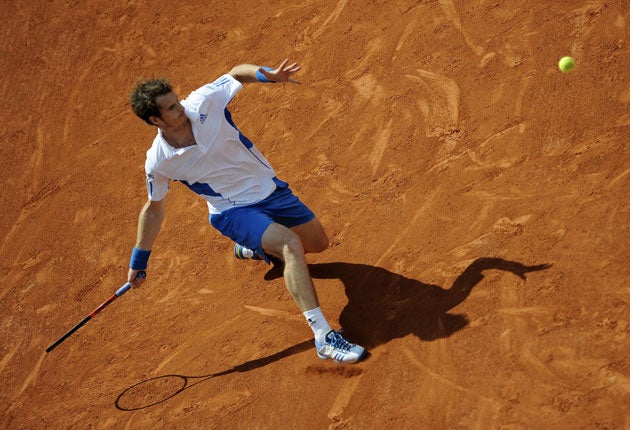Murray learns from the best how to put on grand display
British No 1's 'refusal to panic' could be put to test by Berdych today

There are frustrations in playing in an era domin-ated by Roger Federer and Rafael Nadal – not least the fact that they have won 18 of the past 20 Grand Slam tournaments between them – but there are also benefits. Andy Murray, who will equal his own best performance at the French Open if he beats Tomas Berdych in the fourth round here today, acknowledges that watching the Swiss and the Spaniard at close hand has helped him to become a better player.
Murray's maturity has been evident in the way he has handled difficult situations in each of his first three matches here. Against Richard Gasquet he fought back from two sets and a break down, having been outplayed for more than two hours; against Juan Ignacio Chela he coped with playing the match over four different sessions because of rain breaks; and against Marcos Baghdatis he recovered from a third-set meltdown in which he won just 10 points.
"They are tough situations to come back from, but the more you play on the tour, and the more Slams you do well in, you know those situations can happen," Murray said. "It's difficult not to panic, but it's something you learn to deal with better. You don't panic in those situations.
"A lot of it, for me, comes from watching guys like Rafa and Roger, because they've been in those situations like that in Slams a lot during their career. The important thing is not to panic and to play your way out of the problem rather than hit your way out of it. There's no point in just going for it, making rash decisions and bad mistakes. I thought more on the court and that helped."
This is the eighth Grand Slam tournament in succession in which Murray has reached the second week, a record that only Federer can match. During that period the Scot has reached the finals in New York and Melbourne, losing to Federer on both occasions, the semi-finals at Wimbledon and the quarter-finals here.
What does Murray think separates the players, like himself, who consistently contend for honours at the highest level from those just a few places behind in the world rankings? "For me, what's changed with my results in the Slams is learning to deal with difficult situations without panic. I've found ways to come through.
"The physical side is so important to being able to do that. When you go two sets down against a guy like Gasquet, it's very difficult, mentally and physically, to get back in the match, but if you feel like you've put the work in you have a chance.
"Having variety in your game helps as well. If you can change the way you're playing, play different shots, bring your opponent to the net, or come to the net yourself, or hit the ball flat, or with heavier top-spin – those things definitely help. I've always had the variety. I just didn't know how to use it that well, but in the last couple of years I've learned to use it better."
Murray has had arguably the toughest first week of all the leading men, having had to find a way past opponents ranked No 30, 45 and 54. Federer, who now faces his fellow countryman Stanislas Wawrinka, has not had to beat anyone in the top 60.
Murray's next opponent is something of an enigma. With a big serve and big groundstrokes, struck flat and low across the net, Berdych likes to attack at every opportunity. On his day – such as Friday, when he destroyed John Isner for the loss of only five games – the world No 17 can look all but unbeatable, but his Grand Slam record shows a solitary quarter-final appearance, at Wimbledon three years ago. In eight of the past 16 Grand Slam events the 24-year-old from the Czech Republic – perhaps that should read Choke Republic – has gone out in the fourth round.
Murray described his opponent as a risk-taker who "doesn't feel uncomfortable going for his shots". That has paid off so far, Berdych having lost only 25 games in his first three matches here (compared with Murray's 47). The two men have won one match apiece against each other, though they have not met for four years. Berdych acknowledged Murray's strengths. "He's really strong," the Czech said. "He moves well on the court. He can really read his opponent's game; he's a very smart player. He can really find the weak spots. He can change the rhythm of the game, play something different. When he's a little bit down, he can hit some big serves. He's a really strong guy, especially mentally. As we saw in the first round, when he was two sets down, he turned the match around."
Should Murray win today he will play Mikhail Youzhny or Jo-Wilfried Tsonga, the last Frenchman in the competition, in the quarter-finals. The Scot is seeded to meet Federer in the semi-finals.
Murray, however, said that he would continue to take it one round at a time. "So many things can happen in Slams," he said. "Draws can open up, guys can get hurt, or guys can play long matches and get tired and lose matches they shouldn't. But the closer you get to winning the event, it becomes more exciting and a little easier to focus. You go on the match court with fewer doubts than you might do right at the beginning."
Join our commenting forum
Join thought-provoking conversations, follow other Independent readers and see their replies
Comments
Bookmark popover
Removed from bookmarks